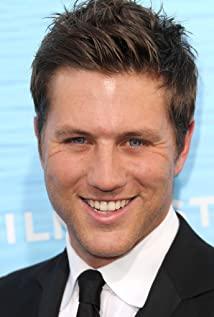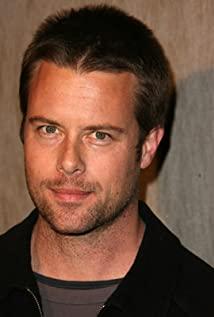Thinking about it, it's been a long time since I left the habit of "watching a movie a day". The computer hard drive is full, and some have never been clicked. Pick one at random: "Want to Cover the Tide" - formerly known as "Shelter" in English. After an hour and a half, I knew how shallow this translation was.
It's a BL story, an American movie. The protagonist Zach is a young man with artistic ideals, or a teenager. He lives with his father, sister Jeanne, and nephew Cody. Influenced by the early death of his mother, Zach has a strong sense of responsibility for his family. He worked part-time, looked after his father and nephew, and gave up his coveted opportunity to study at Carroll College of Art for the sake of his family, and lied to his family that he had failed the exam. In his rare free time, Zach will go surfing, or engage in street art. One day, Zach meets Shaun, brother of his friend Gabe. Shaun is a screenwriter and gay who has come out of the closet. Although the two had known each other before, Zach gradually fell in love with Shaun during this encounter. Shaun encouraged Zach not to give up his ideals easily. In the responsibility of family, the pursuit of art and the love of Shaun, Zach finally got out of the hesitation and found the life he wanted.
Shelter's English translation means n. Shelter, shelter, vt. protection, vi. In the film, Shaun guides Zach to constantly know himself and return to himself. The original Zach did not understand his sexual orientation, and attributed his unhappiness with his girlfriend Tori to a temporary conflict. It was the mutual affection with Shaun that made Zach finally identify with his gay identity. Before and after the delicate demonstration of Zach's inner struggle, the film arranged two conversations between his sister Jeanne and him about Cody. Once before Zach met Shaun. Jeanne has to meet her lover and ask Zach to help take care of Cody. Once, after Zach and Shaun kissed for the first time, Jeanne questioned Zach's sexuality and said that Cody, who always regarded Zach as his father, did not want to live in such an environment. Finally, in the increasingly intense guitar background, Zach made his choice. If it is said that this passage is the first step for Zach to recognize his own sexuality from the mental and physical, then comparing Zach's actions after two conversations with Jeanne before and after, we will find that this passage is also his first step towards self-awareness. The first step in value recognition. After the first conversation, Zach complied with Jeanne's advice and took Cody to work and to drop off his friend Gabe. After the second conversation, Zach ignored Jeanne's advice and took Cody to Shaun's house for dinner. Obviously, Zach stopped taking family responsibilities at the expense of himself, and began to find his new coordinates in family responsibilities.
It was Shaun who drove Zach to make this switch. He made no secret of his emotions, and gave Zach, who hadn't recognized his sexuality at the time, a kiss. Zach was forced to take care of Cody at home and was no longer ready to go to Shaun's house for dinner. Shaun asked Zach to bring Cody with him. In the following plot, Shaun continues to play such an important role. He handed Zach an application for admission to the Carroll School of Art, encouraging him to stick to his ideals.
Like most people who are new to homosexuality, Zach feels confused and painful about taking such an unusual path as gay in the face of life pressure. In order to take care of Jeanne and Cody, he chose to leave Shaun. Just when he received the admission notice from Carroll College of Art, Jeanne, who was going to live and work in Portland with her boyfriend, asked him to help take care of her father and Cody. After some psychological struggle, Zach finally chose his own life. Report to the art academy and be with Shaun, as his ex-girlfriend Tori said: You don't belong to people forever. When Zach and Shaun appeared in front of the family hand in hand, and finally lived with Cody, he not only completed the recognition and identification of his own sexuality, but also completed the return of self-worth. It is still Shaun who facilitates this process. It was he who sent Zach's application letter. When the admission notice from Carroll College of Art appeared in front of Zach again, he could no longer give up his ideals, and then the firmness of his feelings came naturally. As at the end of the film, Shaun asked: "What changed?" Zach replied: "I did."
In this film, Shelter's connotation is undoubtedly deepened. Zach wanted to protect his family, protect his sister, and protect Cody, but he lost himself and was extremely painful. Shaun helped Zach get back to himself, really protected Zach and made him happy. At the end of the film, Zach fulfilled his responsibility to help Jeanne take care of Cody, but did not leave Shaun because of Jeanne's objection, and found the best position between responsibility and self. How profound is this truth and how simple it is: if you want to protect others, you must first protect yourself; a person has unlimited responsibilities, but limited power, and he cannot take responsibility at the expense of self. Only by improving oneself can one better take responsibility.
I think it's a very good gay film. Different from most of the previous gay films, the main contradiction it states is not the confrontation between the secular concept and the gay's own emotional appeal, nor the confusion about the cognition of one's own sexuality, but the balance between family responsibility and self. From this point of view, the theme of the film is beyond the gay story, or the gay story is a carrier of the film theme. However, the comrade plot is not subsidiary, but deeply imprinted in it. Compared with the same family, comrades feel the pressure of family responsibilities more than non-comrades, and in the face of this pressure, comrades are more likely to lose themselves and sacrifice themselves. Family responsibility is a very oriental theme (so to speak, it’s not that the west doesn’t take family responsibility seriously, it’s just that the east takes it more seriously). Therefore, such gay films should be more emotional to the Gay community in China.
View more about Shelter reviews











